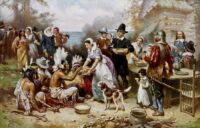We find interesting the discussion ensuing from Aug Sebastiani’s comment on KSVY about restoring the nativity scene to the Plaza. While we don’t feel strongly about that issue, it was his willingness to challenge current thinking that led us to endorse Sebastiani, a fresh thinker from an old family, in his bid for a seat on the Sonoma City Council.
People often say they miss the old traditions. We realize we can’t go back to the past, and the past probably never even existed the way we think it did. But there is a general feeling that this country has lost some of its values. Carefully removing from schools and public life all reference to God may be coincidental, or it may be related.
We now have “holiday” trees and secularized carols. Santa reigns, and Christ is pushed aside. And not just at Christmas time, but all year long, with cultural pressure to focus on material possessions.
So, is America a “Christian” nation, or not? Arguably, there were two unique concepts that infused the American political experiment two centuries ago, whose legacy we enjoy today. Certainly, their incorporation into our founding documents was revolutionary, and they were reflective of the Christian principles of the founders.
First, the individual value of a human life was specially recognized, despite the fact that the young nation accepted slavery as a political compromise, needing a Civil War some 75 years later to resolve that issue. Second, the founders acknowledged the fallibility of human nature. That is, persons with power cannot long resist its exercise for personal gain, seeking to retain and expand their power. So they divided the power among three branches of government, balancing each against the others.
This second point is relevant particularly to our nation’s continuing failure to live up to the inspiring language of the Declaration of Independence and the Preamble to the Constitution. Or to Christian principles in general, something no nation could.
Nevertheless, many view the United States as the last bastion of Christianity, including some of our national leaders today. It is also interesting to learn how others view us. In particular, here is what Osama bin Laden had to say, taking credit for the collapse of the Soviet state in 1991, two years after the Taliban’s defeat of the Soviet army in Afghanistan: “In this final phase of the ongoing struggle, the world of the infidels was divided between two superpowers – the United States and the Soviet Union. Now we have defeated and destroyed the more difficult and the more dangerous of the two. Dealing with the pampered and effeminate Americans will be easy.”
Sobering words, as our country prepares again to celebrate the birth two millennia ago of a poor Jew whose revolutionary ministry changed the course of history. Even if we participate in the Christmas season only by the exchange of gifts, we are part of this nation and, apparently, have much at stake in its image and conduct.
Local politics matter. We appreciate the very fact that issues like a nativity scene in the public square can be raised at all. At the least, this leads to dialogue within the community and encourages assessment of our own beliefs. We don’t have to be a nation of Christians, but how we behave, and what of our heritage we value, matters, too.




